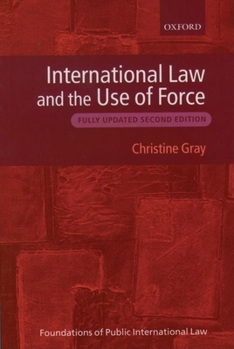International Law and the Use of Force (Foundations of Public International Law)
Select Format
Select Condition 
Book Overview
Since the publication of the first edition of International Law and the Use of Force, events have led to a major reappraisal of international law on the use of force. The terrorist attacks of September 11th and Operation Enduring Freedom in Afghanistan have raised fundamental questions about the right to use force in self-defense against terrorism, and the scope of the 'war on terror'. The question of whether there is now a new doctrine of pre-emptive self-defense has divided States. The invasion of Iraq in 2003 has prompted serious questions about the role of the United Nations and the legal basis of Operation Iraqi Freedom: had the UN Security Council authorized the use of force against Iraq? Was the US entitled to act without such authorization? This volume covers the whole of the large and controversial subject of the use of force in international law; it examines not only the use of force by States, but also the role of the UN and regional organizations in the maintenance of international peace and security.
Format:Paperback
Language:English
ISBN:0199271313
ISBN13:9780199271313
Release Date:October 2004
Publisher:Oxford University Press
Length:352 Pages
Weight:1.25 lbs.
Dimensions:6.1" x 0.7" x 9.1"
Customer Reviews
1 rating
Good account of international law on the use of force
Published by Thriftbooks.com User , 21 years ago
Christine Gray, a Reader in International Law at Cambridge University, has written an excellent account of current international law on the use of force by states. She examines the laws banning the use of force, civil wars, self-defence, collective self-defence, the use of force against terrorism, the UN and the use of force, Security Council authorisation for the use of force, and regional peacekeeping and enforcement actions. International law depends on the defence of nations' rights to self-determination, sovereignty and independence. She shows that the UN remains committed to the prohibition of any forcible intervention in the internal affairs of any nations. Gray maintains that the reasoning of the International Court of Justice in Nicaragua's case against the USA in 1986 is of paramount importance in this area because it is the Court's first extended discussion of the law on the use of force. The Court found that Nicaragua had not attacked anybody, but that the US government had illegally used force and intervened in Nicaragua. The Court rejected the US claim that its Contra war was justified as `humanitarian' intervention. The US state has refused to accept the verdict. Gray shows that the similar recent US/British attacks on Iraq and Yugoslavia were also illegal: "The use of the doctrine of implied authorization by the Security Council to justify the military action by the USA and the UK in Iraq in 1993 and 1998, by NATO in Kosovo and most recently by the USA, the UK and Australia in Operation Iraqi Freedom shows lip-service to the authority of the UN, but an unwillingness actually to accept the decisions of the Security Council." As UN Secretary-General Kofi Anna said in 1999, "enforcement actions without Security Council authorisation threaten the very core of the international security system." On 16 September 2004, he stated that the war on Iraq was illegal. Recent UN Resolutions have not endorsed the war as legal. The illegal invasion has now become an illegal belligerent occupation.





